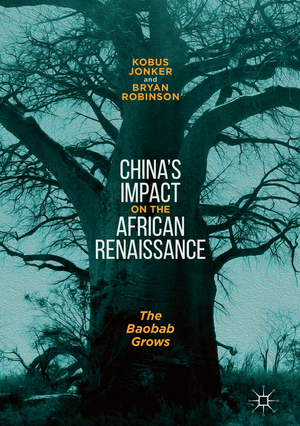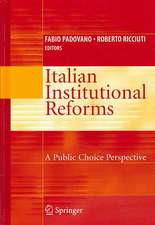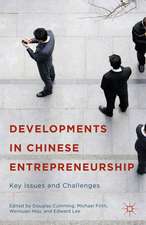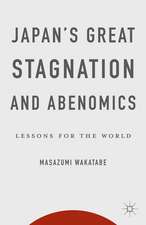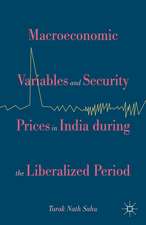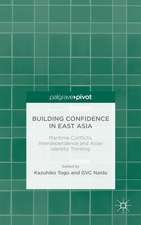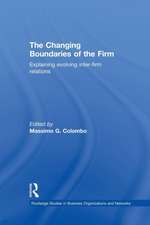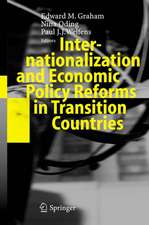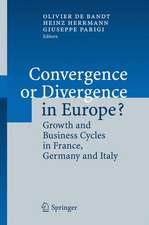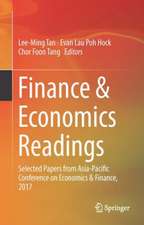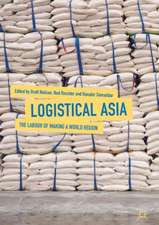China’s Impact on the African Renaissance: The Baobab Grows
Autor Kobus Jonker, Bryan Robinsonen Limba Engleză Hardback – 16 iul 2018
| Toate formatele și edițiile | Preț | Express |
|---|---|---|
| Paperback (1) | 583.13 lei 6-8 săpt. | |
| Springer Nature Singapore – 9 feb 2019 | 583.13 lei 6-8 săpt. | |
| Hardback (1) | 731.10 lei 6-8 săpt. | |
| Springer Nature Singapore – 16 iul 2018 | 731.10 lei 6-8 săpt. |
Preț: 731.10 lei
Preț vechi: 891.59 lei
-18% Nou
Puncte Express: 1097
Preț estimativ în valută:
139.89€ • 146.48$ • 116.03£
139.89€ • 146.48$ • 116.03£
Carte tipărită la comandă
Livrare economică 10-24 aprilie
Preluare comenzi: 021 569.72.76
Specificații
ISBN-13: 9789811301780
ISBN-10: 9811301786
Pagini: 313
Ilustrații: XX, 308 p. 54 illus.
Dimensiuni: 148 x 210 mm
Greutate: 0.54 kg
Ediția:1st ed. 2018
Editura: Springer Nature Singapore
Colecția Palgrave Macmillan
Locul publicării:Singapore, Singapore
ISBN-10: 9811301786
Pagini: 313
Ilustrații: XX, 308 p. 54 illus.
Dimensiuni: 148 x 210 mm
Greutate: 0.54 kg
Ediția:1st ed. 2018
Editura: Springer Nature Singapore
Colecția Palgrave Macmillan
Locul publicării:Singapore, Singapore
Cuprins
1. China in Africa: New Colonists or Facilitators of Development and Growth.- 2. Renewal of Africa: The Organic Growth Paradigm.- 3. Economic Growth and Diversification Fueling Development in Africa.- 4. Infrastructure - The Most Important Enabler of Organic Growth in Africa.- 5. The Role of Effective Governments and Institutions.- 6. A Skilled and Educated Workforce for Africa.- 7. Developing a Sustainable Africa through Green Growth.- 8. Improving the Human Well-Being of All Africans.- 9. Integrated Organic Growth: The Cases of Cameroon and Mauritius.- 10. The Impact of China on the African Renaissance: Let the Baobab Grow.
Notă biografică
Kobus Jonker is a Professor in Business Strategy and International Business at the Nelson Mandela University Business School in Port Elizabeth, South Africa. He started his academic career in 1989 and pioneered the establishment of the Business School at the Nelson Mandela University in 2005. He has facilitated the strategic planning sessions of several prominent companies and consulted to the senior management of various companies in the past 20 years. He holds a doctoral degree in Business Strategy from the University of Pretoria.
Bryan Robinson is a Research Associate and lecturer in Business and Society at the Nelson Mandela University Business School in Port Elizabeth, South Africa. He holds a doctoral degree in Business Administration from the Nelson Mandela University. His research specializes in the fields of business ethics, corporate governance, development economics and globalization. His research into foreign direct investment in Africa takes a specific focus on China’s engagement in Africa and its socio-economic impact.
Textul de pe ultima copertă
This book provides the first comprehensive academic study of what China's trade with, and investment in, African countries mean for the socio-economic well-being of the continent. Based on the African Tree of Organic Growth Framework developed in the book, Jonker and Robinson outline the factors necessary in realizing Africa's Renaissance vision and the impact that the Chinese might have on this process. Using the metaphor of the Baobab tree, the authors analyze the historical, cultural and economic contexts within African countries, the channels available to produce development and growth, and the fruits or social and economic well-being created by this integrated process. The book takes readers on a journey of numerous African examples and case studies, describing and analyzing the challenges and complexities of countries in their desire to achieve organic, cultural, scientific and economic renewal, and the improvement of the well-being of their citizens. This book will be of great value to economists, people who wish to do business in Africa, China-watchers, those who are following the development and growth of Africa, and more.
Kobus Jonker is a Professor in Business Strategy and International Business at the Nelson Mandela University Business School in Port Elizabeth, South Africa. He started his academic career in 1989 and pioneered the establishment of the Business School at the Nelson Mandela University in 2005. He has facilitated the strategic planning sessions of several prominent companies and consulted to the senior management of various companies in the past 20 years. He holds a doctoral degree in Business Strategy from the University of Pretoria.
Bryan Robinson is a Research Associate and lecturer in Business and Society at the Nelson Mandela University Business School in Port Elizabeth, South Africa. He holds a doctoral degree in Business Administration from the Nelson Mandela University.His research specializes in the fields of business ethics, corporate governance, development economics and globalization. His research into foreign direct investment in Africa takes a specific focus on China’s engagement in Africa and its socio-economic impact.
Caracteristici
Explores in-depth Chinese investments in Africa Provides a new paradigm of China's impact in the world outside of Asia Analyzes China's rise from an African perspective
